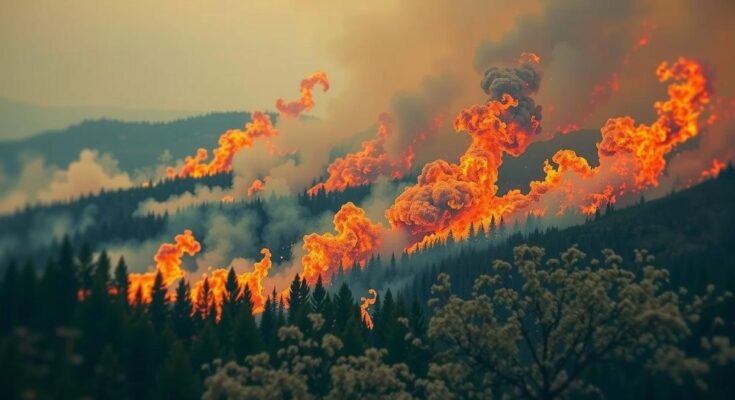Wildfire smoke pollution is linked to an estimated annual death toll of 12,566, driven by the rising severity of wildfires due to climate change. The study reveals a significant increase in smoke-related deaths, especially in South America, Australia, and Europe. Researchers emphasize the health risks posed by PM2.5 exposure, which is particularly deadly for vulnerable populations. Urgent action is required in emissions reduction and fire management to mitigate these impacts.
Smoke pollution resulting from wildfires is directly responsible for approximately 12,566 annual deaths globally, a significant increase associated with climate change. This alarming data points to the escalation of wildfire severity in tandem with global warming, leading to deteriorating air quality that exacerbates public health issues. The surge in deaths attributed to wildfire smoke has grown perilously from 669 in the 2000s—a decade that preceded the 2010s—to over 12,000 within the 2010 decade alone. Overall, related fatalities have jumped from 46,401 in the 1960s to nearly 98,748 in the 2010s, with only a portion specifically linked to climate change. Regions such as South America, Australia, and Europe show marked increases due to rising temperatures and declining humidity in boreal forests, while South Asia has experienced fewer deaths due to the region’s more humid conditions. Chae Yeon Park, lead researcher from the Japanese National Institute of Advanced Industrial Science and Technology, noted the deepening public health crisis posed by climate change, stating, “This indicates that climate change is increasingly posing a threat to public health, driven by more fire smoke even affecting densely populated areas.” The study, published in Nature Climate Change, utilized pollution models and health risk assessments to demonstrate the impact of emissions on mortality directly associated with climate change. The hazardous smoke produced by wildfires releases PM2.5 particles, which pose significant health risks including premature death, exacerbated asthma, cardiac irregularities, and decreased pulmonary function. Particularly vulnerable groups include individuals with pre-existing heart and lung conditions, older adults, pregnant women, children, and low-income populations. The increasing frequency of wildfires introduces a growing risk, as these events now contribute to about one-fourth of the total PM2.5 exposure for Americans, a pollutant also derived from other sources such as transportation and fossil fuels, which accounted for approximately 8.7 million deaths worldwide in 2018. Wildfire smoke can propagate across international borders, as evidenced by smoke traveling from western Canada to northern parts of the United States this past summer. Presently, nearly thirty wildfires are active across twelve states, reversing gains towards cleaner air. Co-author Christopher Reyer emphasized the expansive consequences of wildfire smoke, stating, “It is crucial to understand that the impact of smoke from fires extends beyond those living directly in the affected areas — it also significantly affects people living in cities.” He highlighted the necessity for effective emission reduction strategies and improved fire management to safeguard ecosystems, economies, and public health on a global scale.
The impact of climate change on wildfire frequency and intensity has become increasingly evident, as rising temperatures and fluctuating humidity patterns create conditions conducive to more severe fires. Smoke from these wildfires is a significant source of air pollution, releasing harmful particulate matter like PM2.5, which has dire consequences for human health. The global data indicates a worrying trend—additionally fueled by climate change—that shows a steep rise in mortality rates related to wildfire smoke exposure. As such, researchers are prioritizing the understanding of these impacts to support better health advisories and policy-making.
In summary, the rising death toll associated with smoke pollution from wildfires underscores an urgent public health issue exacerbated by climate change. With annual fatalities increasing significantly, particularly in regions experiencing heightened fire activity, it is imperative to address the underlying causes of climate change and implement proactive strategies for smoke management and emission reduction. The well-being of vulnerable populations must be prioritized as part of comprehensive public health policies in response to the increasing threat of wildfires and their associated health impacts.
Original Source: www.independent.co.uk




